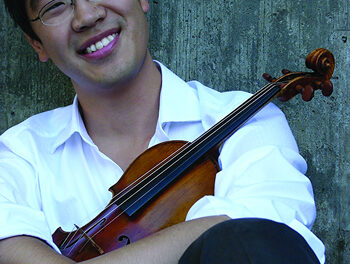Like a touch of fall in the air, there was a note of sadness in this penultimate concert of the Highlands-Cashiers Chamber Music Festival, as this community of concert goers prepares to say farewell to their guest artists. For this concert at the Albert Carlton-Cashiers Community Library, Festival Artistic Director Will Ransom assembled a stellar roster of artists who are or who have been students at the Julliard School. Another connection was that several of them (including Ransom and many in the audience) have ties to the Atlanta area. The featured performers were pianist Fei-Fei Dong, violinist Margeaux Maloney, violist Andrew Gonzalez, and cellist Khari Joyner, with Ransom collaborating in one work. The creative programming by Ransom – various solos and duets in the first half, and a summative work for all after intermission – ensured that there would be something for everyone to enjoy. This concert was underwritten by Ginger Kennedy and Kevin Naylor.
Lack of space prohibits me from chronicling the many accomplishments of these young professionals, so googling them will yield the reader a wealth of further information. Maloney received her undergraduate music degree from Julliard in 2014 and is currently pursuing a Graduate Certificate in Violin Performance at the University of Southern California. Gonzalez is currently at Julliard where he is finishing his master’s degree. Joyner earned both undergraduate and master’s degrees at Julliard, where he has remained to pursue his Doctor of Musical Arts degree. Dong, a native of China, moved to the United States to earn both undergraduate and master’s degrees at Julliard under the tutelage of Yoheved Kaplinsky. She also appeared in Virtuosity, a film about the 2013 Van Cliburn International Piano Competition where she was a finalist. The film was broadcast recently on PBS.
The program opener was Schumann’s Märchenbildern (Fairy Tale Pictures), Op. 113 for viola and piano (Ransom). Written in 1851 during an intense period devoted to instrumental composition, it consists of a charming set of miniature character pieces linked by key relationships. Gonzalez’s first arching phrase triggered a like response by the piano, followed by shorter phrase exchanges in a wistful character. The second movement “Lebheft” was animated by dotted-note figures beautifully echoed by each player, followed by “Rasch,” which featured etude-like bowing maneuvers in the viola and several mood fluctuations. The last movement “Langsam, mit melancholischem” began in the viola’s low register. For this Gonzalez summoned some of his richest tones and finest playing.
Maloney was featured next in Eugène Ysaÿe‘s Sonata in A minor for Solo Violin (“Obsession”), Op. 27, No. 2. This is an exceptional work, with a huge dramatic range of expression and titanic technical demands on the single player. There are familiar ghosts within the score: Bach is quoted literally within the first movement and conjured stylistically throughout, and the liturgical melody “Dies irae” from the Requiem mass recurs repeatedly. The trick, as with all difficult music, is to get it to sound effortless and not “worked.” The best moments in Maloney’s performance were the soulful second movement (Malinconia), where the tone production improved, and the charming third movement (Danse des Ombres: Sarabande) with its carefully defined set of six short variations.
Cellist Joyner and pianist Dong joined forces next for “Louange á l’Éternité de Jésus,” (Praise to the Eternity of Jesus), the fifth movement from Messiaen’s Quartet for the End of Time. This work of transcendent beauty was inspired by the 10th chapter of the book of Revelation and was composed while Messiaen was confined in a German concentration camp. One has the sense of time standing still, as the musicians are directed to play “infinitely slow.” Joyner performed it from memory, spinning its long, expansive phrases masterfully to repeated chords in piano which swelled and ebbed. This supreme moment of stillness was one of the concert’s highlights. The two then shook off the hypnotic spell to perform Manuel de Falla’s enormously appealing “La Vida Breve Primera Danza Espanola,” bringing shouts of joy from the delighted audience.
Next and just before intermission, Dong performed two solo showstoppers, Chopin’s dazzling Waltz in A-flat, Op. 42, No. 2, and a knuckle-busting transcription of Mozart”s “Rondo alla Turca” by Russian pianist Arcadi Volodos (b. 1972). Dong is a pianist who is well on her way to stardom, gifted with sure musical instincts, technique to burn, and an uncanny ability to connect with her audience. Her playing is often muscular, like that of a major contest winner, and, while nuanced, frequently overpowered the room. The range of her articulations always insured that the various planes of musical activity could easily be heard. Her enthusiasm and obvious love of music were infectious and brought the audience to its feet in a prolonged ovation.
To end the concert, Dong, Maloney, Gonzalez and Joyner assembled for Dvořák’s Piano Quartet No. 2 in E-flat, Op. 87. Dvořák composed this piece in 1889 before he had visited the United States, and its “old world charm” could be heard in its melodic intervals, rhythms, and even the simulation of a cimbalom, a large type of hammered dulcimer used by various ethnic groups in central Europe. Although this ensemble had only been together for a few days, their playing was remarkably cohesive. Dong anchored and drove the group from the keyboard, exhibiting both her forceful playing style and feathery-light touch where necessary. The second movement Lento allowed the cello some magnificent solo passages, as well as dramatic mood shifts from all the players. The joy-filled third movement was my favorite due to its rhythmic vitality and special “ethnic” effects. The fourth movement was a rousing finale which allowed the viola a few lovely moments in the spotlight, thus bringing this marvelous chamber work to a close. The audience was on its feet almost before it was over, voicing its appreciation again and again.











